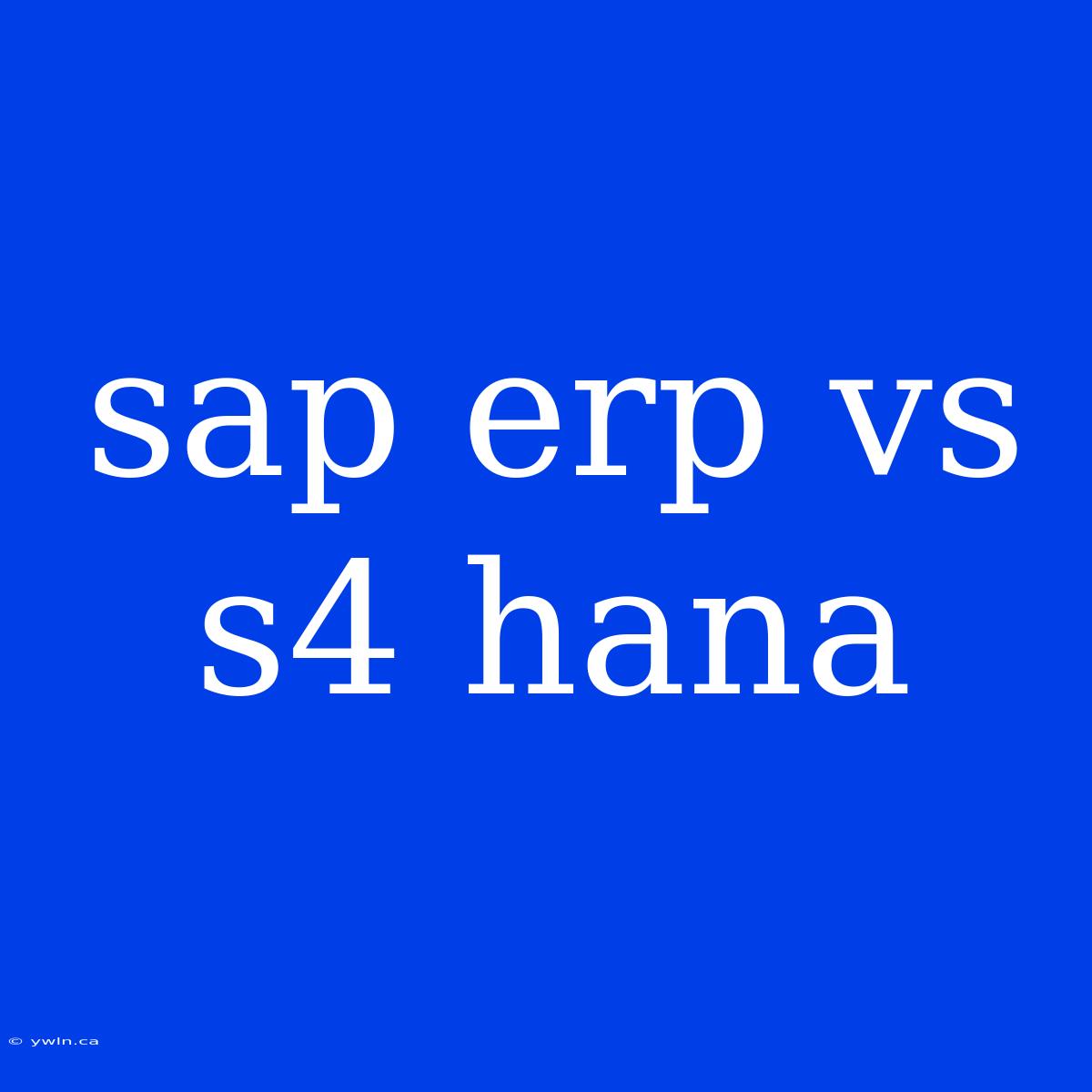SAP ERP vs. S/4HANA: Which One Is Right for Your Business?
Is your business struggling with outdated technology and inefficient processes? SAP ERP and S/4HANA are both powerful enterprise resource planning (ERP) systems designed to streamline operations. But which one is right for you?
Editor Note: This comprehensive guide compares SAP ERP and S/4HANA, outlining their key differences and benefits. Choosing the right ERP system is crucial for a business's success, and this article provides valuable insights to aid in your decision-making process.
Analysis: We have meticulously analyzed the features, functionalities, and industry trends surrounding both SAP ERP and S/4HANA. This analysis is designed to help you understand the key differences between the systems and make an informed choice based on your unique business needs.
Key Takeaways:
| Feature | SAP ERP | S/4HANA |
|---|---|---|
| Architecture | On-premise, Cloud, Hybrid | Cloud, On-premise, Hybrid |
| Data Model | Relational database | In-memory database (HANA) |
| Functionality | Broad range of modules | Simplified, streamlined modules |
| User Experience | Traditional interface | Modern, intuitive interface |
| Integration | Complex integration points | Simplified integration |
| Scalability | Limited scalability | Highly scalable |
SAP ERP: Legacy but Reliable
Introduction
SAP ERP is a well-established ERP system that has been around for decades. Its reliability and vast feature set have made it a popular choice for many large enterprises.
Key Aspects:
- Mature System: Long-standing presence in the market.
- Comprehensive Functionality: Covers a wide range of business processes.
- Customizable: Offers extensive customization options.
Discussion:
While SAP ERP provides a solid foundation for managing business processes, its legacy architecture can present challenges. Its complex integration points and traditional interface can hinder agility and user experience. Moreover, SAP ERP's scalability can be limited, posing issues for rapidly growing businesses.
S/4HANA: The Next Generation of ERP
Introduction:
SAP S/4HANA, the successor to SAP ERP, introduces a modern, simplified approach to enterprise resource planning. Leveraging the in-memory HANA database, S/4HANA significantly improves performance and offers a more streamlined user experience.
Key Aspects:
- In-Memory Database: Faster data processing and real-time insights.
- Simplified Architecture: Streamlined modules for enhanced efficiency.
- Modern User Interface: Intuitive design for better user adoption.
Discussion:
S/4HANA's modern design and simplified architecture make it an excellent choice for businesses looking to improve agility, reduce complexity, and boost efficiency. Its real-time analytics capabilities provide valuable insights for better decision-making. However, migrating from SAP ERP to S/4HANA can require significant investment and resources.
Comparing the Two: When to Choose What
SAP ERP:
- Ideal for: Companies with established SAP ERP systems, seeking cost-effective solutions for a relatively short-term need.
- Consider: Limited scalability, potential for high maintenance costs, and a complex user interface.
S/4HANA:
- Ideal for: Businesses seeking modern ERP solutions, enhanced agility, and improved user experience.
- Consider: Potential migration costs, the need for skilled resources, and the possibility of a steep learning curve.
FAQs
Frequently Asked Questions:
| Question | Answer |
|---|---|
| Is S/4HANA compatible with SAP ERP? | Yes, S/4HANA is designed to be compatible with SAP ERP, but migrating between the two requires careful planning and execution. |
| What are the key benefits of S/4HANA? | Faster processing speeds, simplified processes, improved user experience, and real-time analytics capabilities. |
| Is S/4HANA suitable for small businesses? | S/4HANA can be tailored to fit different business sizes, but smaller businesses may find the implementation costs and complexity challenging. |
| What are the main differences between SAP ERP and S/4HANA? | S/4HANA offers a modern architecture, simplified processes, and an intuitive user interface, while SAP ERP remains a reliable and mature solution. |
| Is it possible to integrate S/4HANA with other systems? | Yes, S/4HANA provides robust integration capabilities for seamless connectivity with other systems. |
| How long does it take to migrate from SAP ERP to S/4HANA? | Migration timelines vary depending on the complexity of your business processes and the scope of the migration. |
Tips for Choosing the Right ERP System
Tips for Making the Right Choice:
- Assess Your Business Needs: Define your specific requirements and priorities.
- Evaluate Your Budget: Consider the costs associated with implementation, training, and ongoing maintenance.
- Consider Your IT Infrastructure: Determine if your existing infrastructure can support the selected ERP system.
- Seek Expert Guidance: Consult with experienced ERP consultants to get tailored advice.
- Pilot Before You Commit: Consider a pilot implementation to test the chosen system before a full rollout.
Summary of SAP ERP vs. S/4HANA
This article explored the key differences between SAP ERP and S/4HANA, providing insights to help businesses choose the most suitable ERP system for their needs. SAP ERP, a mature and reliable system, remains a viable option for certain businesses, while S/4HANA offers a modern, simplified approach with enhanced functionality and a streamlined user experience.
Closing Message: Choosing the right ERP system can significantly impact your business's success. By understanding the unique features and benefits of both SAP ERP and S/4HANA, you can make an informed decision that aligns with your strategic goals and sets your business on a path toward operational excellence.

